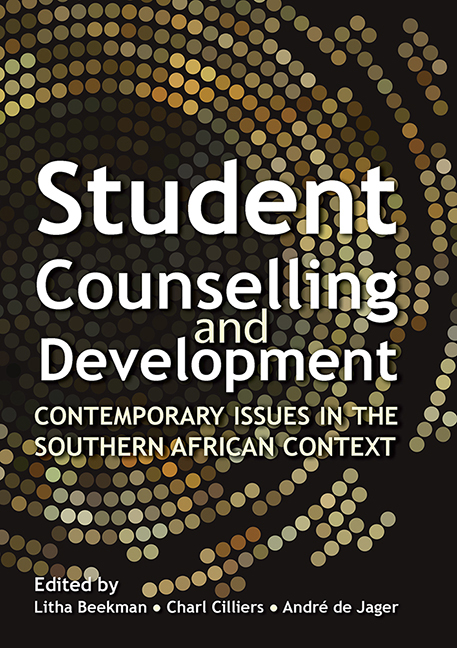Book contents
- Frontmatter
- Contents
- Figures
- Tables
- Preface
- Section 1 Development of Student Counselling and Development in Southern Africa
- Section 2 Theoretical Foundations of Student Counselling and Development in Higher Education
- Section 3 Services and Programmes Provided by Student Counselling and Development Units
- Section 4 Student Counselling and Development For Special Groups
- Section 5 Quality Assurance and Ethical and Professional Issues
- Contributors
- Index
Section 1 - Development of Student Counselling and Development in Southern Africa
Published online by Cambridge University Press: 22 February 2020
- Frontmatter
- Contents
- Figures
- Tables
- Preface
- Section 1 Development of Student Counselling and Development in Southern Africa
- Section 2 Theoretical Foundations of Student Counselling and Development in Higher Education
- Section 3 Services and Programmes Provided by Student Counselling and Development Units
- Section 4 Student Counselling and Development For Special Groups
- Section 5 Quality Assurance and Ethical and Professional Issues
- Contributors
- Index
Summary
This section consists of three chapters which together contribute to an understanding of the development and current situation of Student Counselling and Development (SCD) in Southern Africa.
Chapter 1 uses historical data to provide an overview of the developmental phases of SCD. It provides a perspective on how SCD has progressed through these phases over the past 60 years to its current status in Southern Africa. Progress is described not only in terms of how SCD has experienced spontaneous development from within itself as a growing profession. It is also described in terms of how, at different times in its history, the development of SCD has not only been encouraged, but shaped, by events in the socio-political and higher education (HE) context. Born out of these circumstances, SCD in the Southern African context has developed a unique professional identity with unique strengths. One of these strengths is that SCD has retained a holistic professional approach to its task. Unlike the fragmentation of SCD into administrative student services amongst counterparts across the world, SCD in Southern Africa has retained the quality of a professional identity in partnership with its academic colleagues. The potential to continue to achieve this positions the profession entirely at the centre of the core business of HE.
The second chapter provides a detailed description of the dynamic development of the organised SCD profession in the Southern African region. The Southern African Association for Counselling and Development in Higher Education's (SAACDHE) archived records covering 30 years provide the data for this chapter. The development of SAACDHE is sketched in terms of a model based on the Forming Storming Norming Performing theory which was developed to help explain group development and behaviour. It states that as the group develops maturity and ability, relationships are established and the leader changes leadership style. Beginning with a directive style, leadership moves through coaching and participation and concludes with delegation and finally detachment from the group. SAACDHE has reached the final stage in its group formation. It is performing professionally as a recognised stakeholder in HE in Southern Africa and beyond. Its leadership facilitates further development but members have a clear conceptualisation of what is required from the field.
- Type
- Chapter
- Information
- Student Counselling and DevelopmentContemporary issuesin the Southern African Context, pp. 1 - 2Publisher: University of South AfricaPrint publication year: 2012



